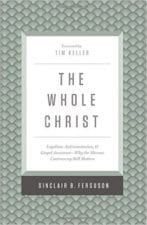This month’s pick is The Whole Christ by Sinclair Ferguson. That title is intriguing, but the subtitle—depending on who you are—is even more intriguing. It is Legalism, Antinomianism & Gospel Assurance—Why the Marrow Controversy Still Matters.
The Marrow controversy was an uproar in the early part of the 18th century in Scotland, and it was occasioned by the republication of a book written by one E.F. (probably a man named Edward Fisher) in the middle of the previous century. The reason it was controversial is the same reason these perennial themes will always be controversial on this side of the Jordan. The relationship between grace and law is certainly a theological problem, but it is far more than that. It is a practical pastoral problem. It is a challenge to the sanctification of every Christian. One side or the other wants control of the spiritual thermostat in your church,
To pick up on a distinction that Ferguson makes in this book, there is far more involved in the grace/law discussion than overt doctrinal commitments. Both sides of the Marrow controversy subscribed to the Westminster Confession. An open legalist avows that the law is the way to salvation. A lesser legalist avows that the law empowers us to live holy lives in the pursuit of sanctification (which it does not, any more than speed limit signs are hooked to your accelerator). But we need to go a step further. There is something that Ferguson describes as the legal temperament.
The human heart is deceitfully wicked, and can turn absolutely anything into a rope (of sand) to climb up to Heaven with. Consider the famous story of the Pharisee and the tax collector who went to the Temple to pray. The one beat his breast and cried for mercy. The other thanked God (soli Deo gloria) that he was not like other men, and that his superiority was all of grace. And so it was that he went home unjustified. But here is the hook.
And so how many of us have gone home and thanked God that we are not like that Pharisee?
John Newton touched the thing with a needle, when he wrote this:
“Self-righteousness can feed upon doctrines—as well as upon works! A man may have the heart of a Pharisee, while his head is stored with orthodox notions of the unworthiness of the creature, and the riches of free grace!”
I want to commend this book to pastors, and to do it with a sense of urgency. Use this book as a diagnostic test, not of your doctrine, but of your doctrinal temperament. And that is because the distance between the adjective and the noun here is sometimes an enormous one. In some cases it is the distance between Heaven and Hell.



It really is a fantastic book!
I heard of this, having looked in to the because I recently finished reading Bahnsen’s “Theonomy.” Are you saying there were WCF subscribers who honestly believed that the law could justify a sinner?
How about subscribers who want to affirm that God won’t be letting sinners run around up there, knocking over the lampstands. So His law will need to be obeyed. Bad habits broke. Some sort of purgatorial period will need to ensue wherein folks’ actions get changed to consistently conform to the new heart His Spirit transplanted. That new behavior is the fulfillment, the culmination — so now the patient has fully recovered. He is fully justified — heart and action. The law is His scalpel, they’d say. Until all the bad behavior gets cut away, the sinner hasn’t yet become… Read more »
This is a terrific book. The theology is sound and the wisdom ditto. What stood out for me was his treatment of the subject of assurance. I’ve gone back to those chapters more than once since I read the book, and will do so again.